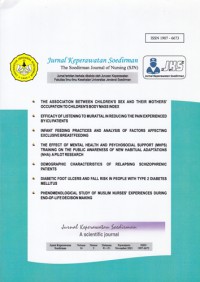
Jurnal
The Association Between Children's Sex and Their Mothers' Occupation to Children's Body Mass Index
Issues related to double-burden malnutrition in children remain crucial. It involves undernutrition and obesity problems in children. Therefore, this study aimed to identify the relationship between mother’s culture and feeding practices along with other factors and the child’s body mass index (BMI). This study was a cross-sectional study and involving 219 mother-child dyad whose children were studying at public elementary schools in DKI Jakarta and selected by using cluster random sampling. Univariate analysis was used to describe the characteristics of children and their parents, followed by bivariate analysis to describe the correlation between children and parents characteristics and obesity. The findings showed that mother’s culture and feeding practices were not significantly correlated to the child’s BMI. However, there were several factors significantly associated with the child’s BMI, namely sex (p:0.009; CI 95%) and mother’s occupation (p:0.026; CI 95%). From the findings, it can be concluded that girls are likely to have higher BMI and mothers working as an entrepreneur are likely to have children with higher BMI. Therefore, it is expected that nurses can provide optimal education related to malnutrition prevention, including obesity in children.
Availability
No copy data
Detail Information
- Series Title
-
Jurnal Keperawatan Soedirman, Vol. 16 No. 3, November 2021
- Call Number
-
(05) 610.5 FAK j
- Publisher
- Purwokerto : Fakultas Ilmu-Ilmu Kesehatan Universitas Jenderal Soedirman., 2021
- Collation
-
Hlm. 91-96
- Language
-
English
- ISBN/ISSN
-
1907-6673
- Classification
-
(05) 610.5 FAK j
- Content Type
-
-
- Media Type
-
-
- Carrier Type
-
-
- Edition
-
Vol. 16 No. 3
- Subject(s)
- Specific Detail Info
-
-
- Statement of Responsibility
-
-
Other version/related
No other version available
File Attachment
Comments
You must be logged in to post a comment
 Computer Science, Information & General Works
Computer Science, Information & General Works  Philosophy & Psychology
Philosophy & Psychology  Religion
Religion  Social Sciences
Social Sciences  Language
Language  Pure Science
Pure Science  Applied Sciences
Applied Sciences  Art & Recreation
Art & Recreation  Literature
Literature  History & Geography
History & Geography